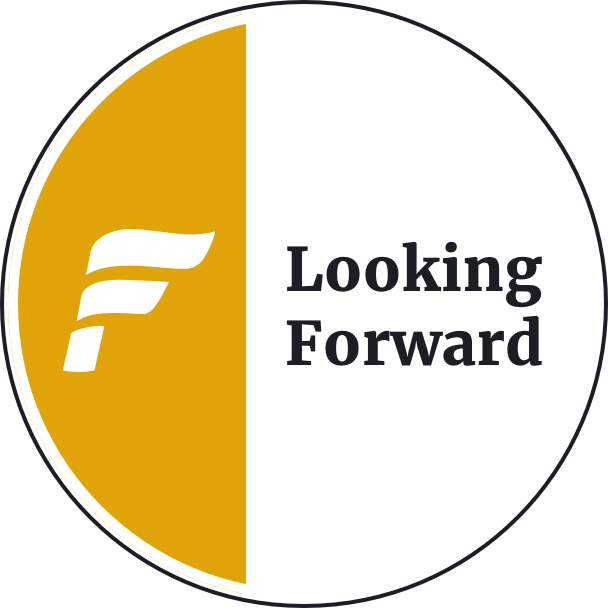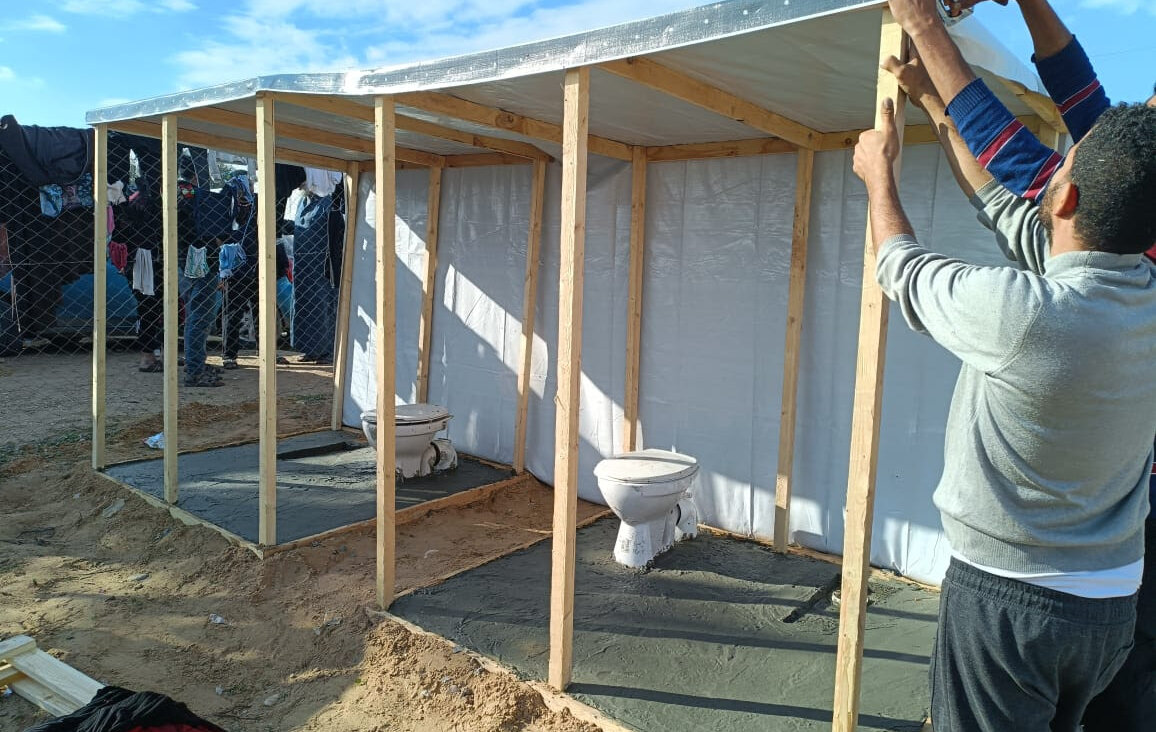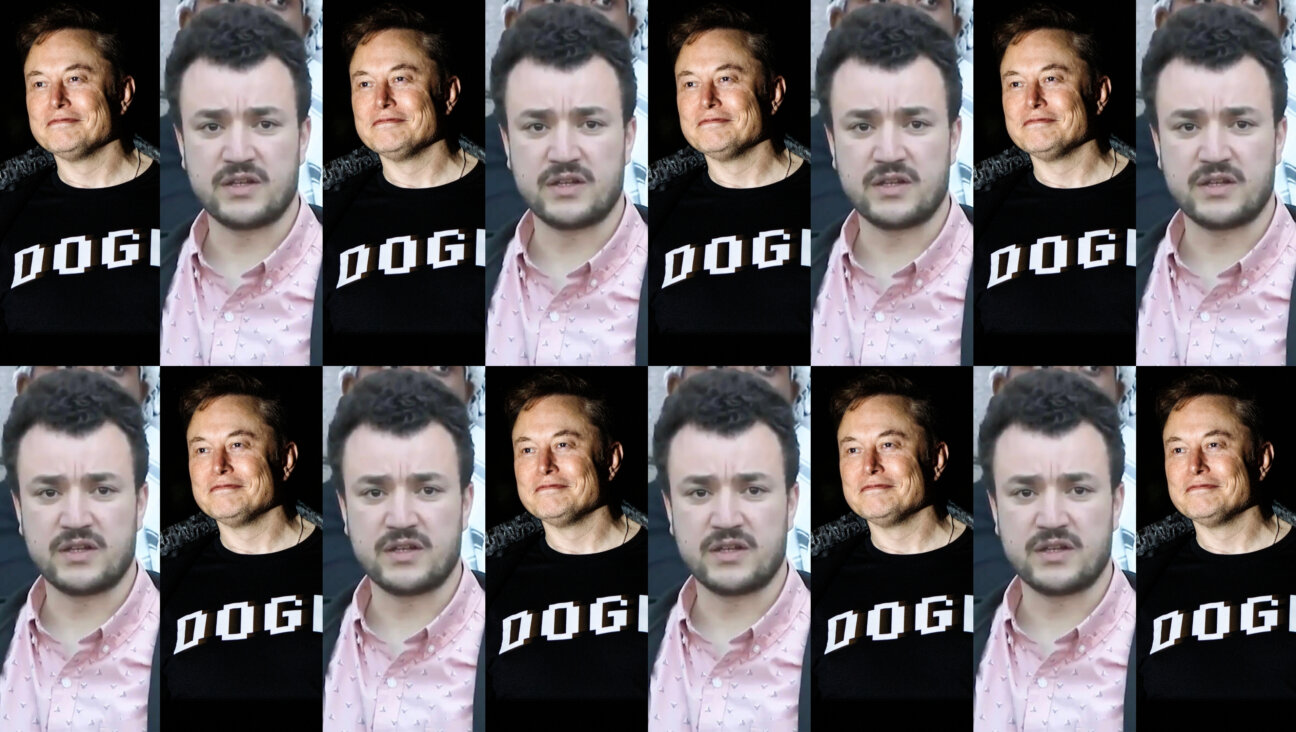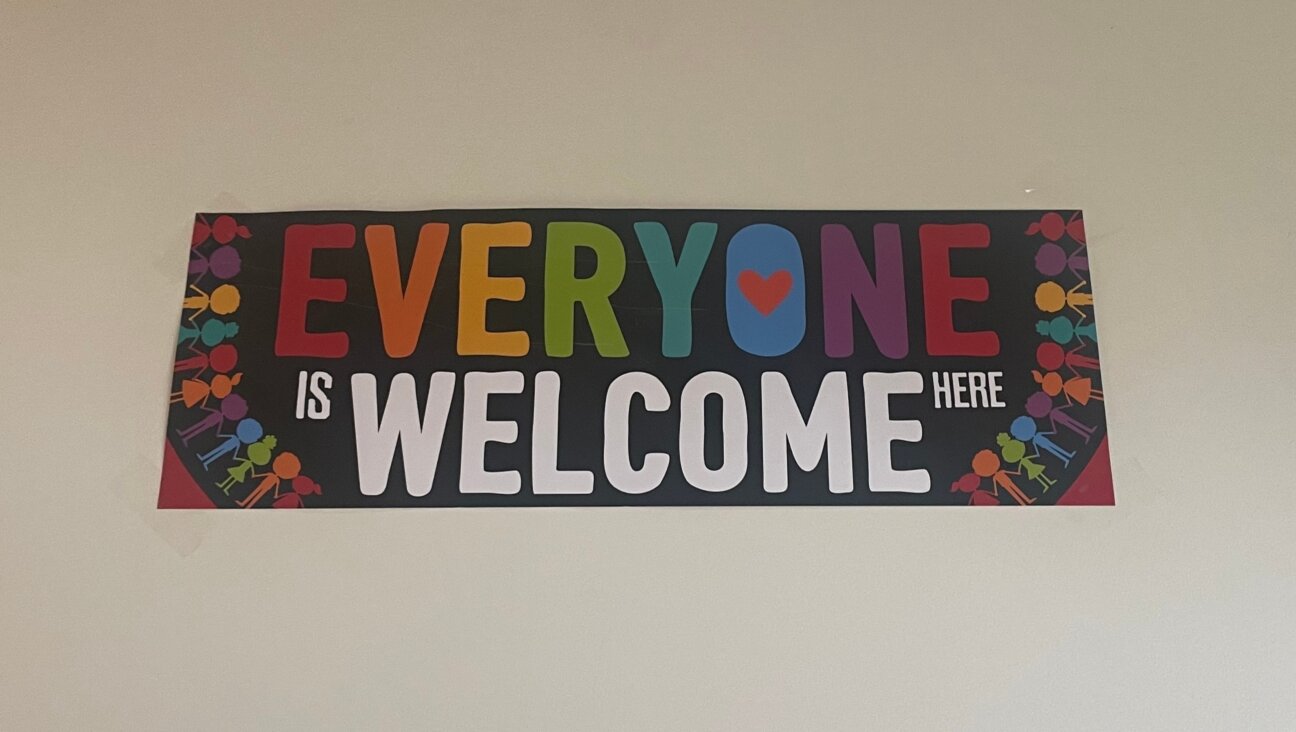When hate comes to your hometown
Chants of “We don’t want no Zionists here” felt like a “knife through the heart” to a Montclair mom
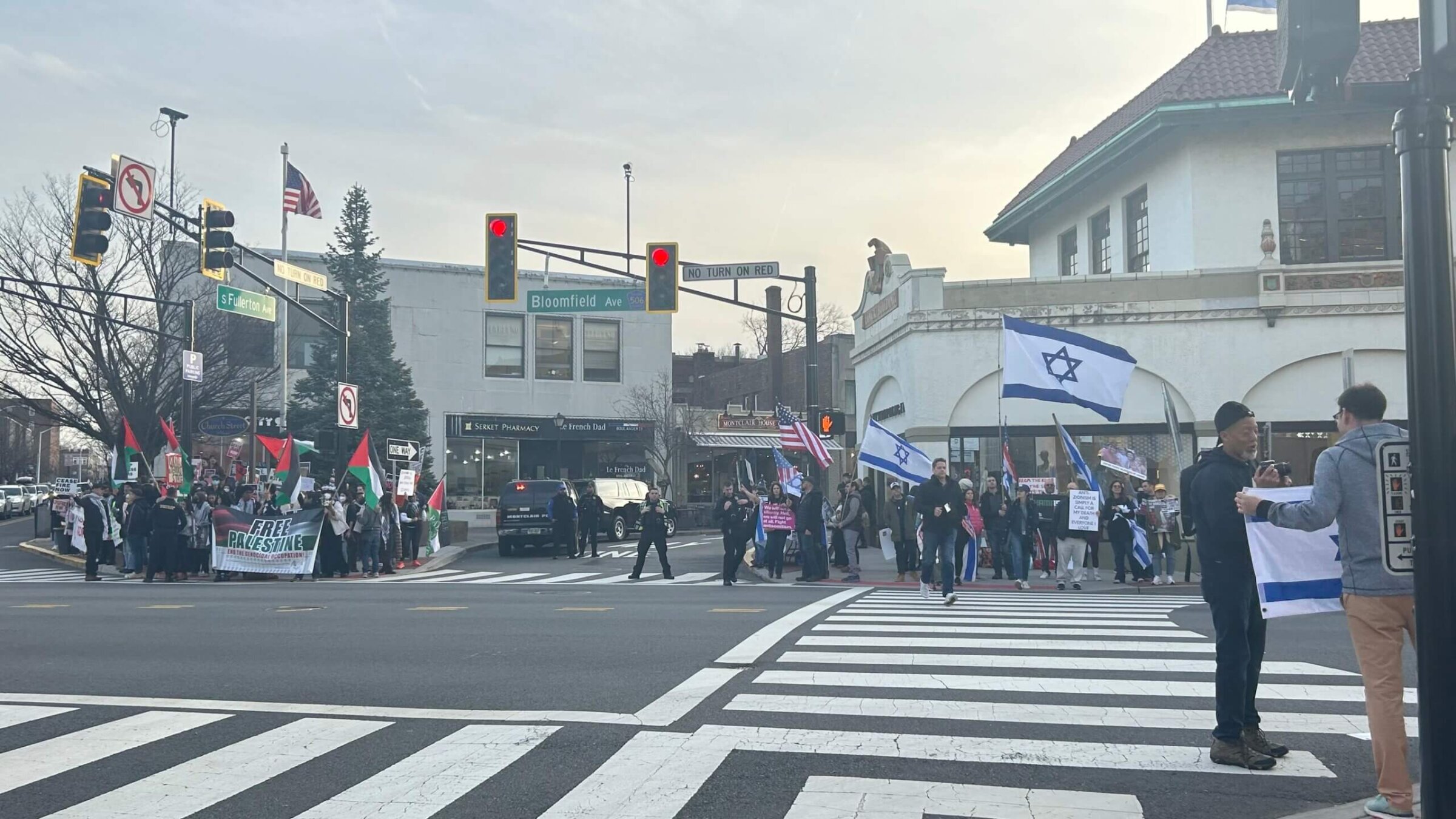
With police forces in between, pro-Palestinian and pro-Israeli protesters stand across the street from one another in Montclair, New Jersey. Photo by Shayna Rudoren
MONTCLAIR, New Jersey — The guy leading the chant was standing a block away from Java Love, which makes great spiced lattes and is owned by a lesbian couple who belong to my synagogue, and two blocks from Beyond Pita, my favorite local falafel and shawarma shop, where the proprietors are Palestinian.
The crowd responding to his calls was a few storefronts from the nonprofit movie house that screened the Holocaust film The Zone of Interest, and a few minutes’ walk from the public library where I stood up for an anti-Zionist group’s right to hold an event last fall. The protesters were on the exact spot where the shuls in our area gather each Simchat Torah to dance and pray. They were waving Palestinian flags in the shadow of a giant flagpole where the Ukrainian c colors have sat underneath the Stars and Stripes for the past two years, and were joined, after Oct. 7, by the flag of Israel.
Say it loud and say it clear, the guy in the black hoodie began. We don’t want no Zionists here! He punched his fist in the air as the crowd joined in. We don’t want no Zionists here! We don’t want no Zionists here! We don’t want no Zionists here!
Welcome to Montclair, New Jersey, circa 2024. A New York suburb of 40,000 known for its racial diversity, liberal politics, magnet schools, impossible real estate prices (and taxes), panoply of restaurants, annual film festival, frequent Yacht Rock concerts and, now, hate speech. Stephen Colbert’s hometown, and mine.
I did not attend the dueling “Ceasefire Now” and “Stand Up to Antisemitism” rallies last Friday afternoon. I was home editing a news story about the removal from a Canadian cemetery of a monument to a Ukrainian unit that fought with the Nazis during World War II. Then I took my kid to Shabbat services and a potluck dinner. All less than a mile from this ugliness.
But since I saw the above video posted on Facebook Monday morning, I have not been able to get it out of my head — or, actually, my gut. Because it really makes me feel a little sick.
I know a lot of my Jewish neighbors, the folks that were on an adjacent corner with Israeli flags and signs like “Denying Jewish history and our connection to Israel is an act of hate,” heard the “No Zionists here” chant as equivalent to “No Jews.” They rightfully point out that it’s impossible to imagine a similar scenario in Montclair targeting any other religious or ethnic group.
I tried giving the most generous benefit of the doubt to the chanters, and thus imagined what other political philosophy might be subjected to a similar dictum. We don’t want no socialists here? No proponents of D.C. statehood? No Black Power advocates, no supporters — or opponents — of Falun Gong or Uyghur rights or Critical Race Theory or Ukrainian sovereignty or Objectivism? No vegans?
The only thing I could come up with was “white supremacists.” Nazis.
Which is exactly what Lani Sommer-Padilla, the Montclair mom who posted the video to Facebook, thought about when she heard the chant, only more personally — and in reverse.
She was thinking about her Grandma Irma, who was born in Berlin in 1918. When Hitler came to power, Sommer-Padilla told me, Irma’s non-Jewish friends “turned on her and her best friend spat in her face.”
“It was just like a knife through the heart,” she told me of seeing the “no Zionists” video. “I knew people who were there, in that crowd. I just feel it so viscerally, partly because of my family’s history. Seeing people standing on a corner in my town, where I live and where I raise my children, calling for our expulsion, has shaken me to my core.”
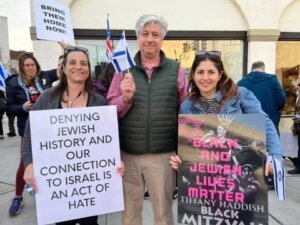
Sommer-Padilla, 44, is a social worker who grew up in New Jersey. She and her husband, who is Puerto Rican and not Jewish, moved to Montclair in 2018 in large part because its reputation for inclusivity made it seem like a place where “we can have JewRican kids and it can be OK.” Their son is 10 and their daughter 13; it was “heartbreaking,” Sommer-Padilla said, to have “to explain to her it might not be safe” to hang out with her friends on Church Street after school because of the protest.
Sommer-Padilla helped organize local Black Lives Matter demonstrations in 2020, Stop Asian Hate rallies in 2021, and petitions against severe budget cuts to Montclair schools last spring. When former President Donald Trump proposed the ban on Muslim immigrants, she said, “ran in the middle of the night to Newark Airport to be a watchdog.” Her 2017 Honda Pilot bears a big “RESIST” bumper sticker.
She was with the anti-antisemitism group last Friday, holding a “Black and Jewish Lives Matter” sign she made featuring a photo of Tiffany Haddish. She said she was one of several people who told a fellow protester to put down a sign that said the Israeli flag was the only one that should be seen “from the river to the sea.”
Sommer-Padilla has been to Israel twice, in 1986 and 1994, to visit relatives of her father, a son of Holocaust survivors born in 1945 in Romania. She said she’s “never been involved in anything related to Israel until now,” but always identified as a Zionist, just like Grandma Irma, whose Florida apartment was filled with plaques honoring her donations to Israeli causes until she died at age 102.
“I identify as a Zionist in its root definition, not the way it’s been corrupted by extremist fundamentalists,” Sommer-Padilla told me. “At its core, what Zionism means is that Jews have a right to self determination. It means that we have a right to exist just like anybody else with dignity, etc., etc. And a right to a homeland, as well. Just like every other ethnic and religious group in the world.”
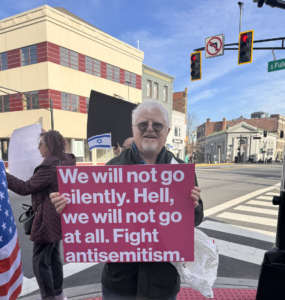
Tragically, the term Zionist has indeed been corrupted and weaponized. By anti-Zionist leftists who equate it with racism or “settler colonialism,” ignoring both Jews’ ancient roots in the Holy Land and the fact that most Israelis came as refugees from Eastern Europe or North Africa and have no other homeland to return to. And by the ultra-nationalist “Israel right or wrong” crowd, including that man in Montclair with the anti-Palestinian flag sign.
But the Zionists that the guy in the black hoodie doesn’t want in Montclair include President Joe Biden, who got 89% of the votes cast in our town in 2020. And probably Sarah Silverman, who I saw perform at our Wellmont Theater a year ago — or at least her sister Susan, a rabbi who lives in Jerusalem. It includes the hundreds of thousands of Israelis of all political stripes who filled the streets every Saturday night for nine months protesting the racist, right-wing government’s attempt to undermine its democracy.
Alan Cooperman, director of the Pew Research Center, told me a few years ago that Pew had never done a poll asking American Jews, or all Americans, whether they identify as Zionists because “many people may be unfamiliar with the term or may have different understandings of the term.”
“Do you meant Herzl’s vision of Zionism or do you mean Ze’ev Jabotinsky’s version?” he asked rhetorically. “Even among Jews, Zionism could mean different things to different people. Any definition you choose, some people are going to say, ‘That’s not a proper definition.’”
And whichever definition you choose, whichever group you target, I’m going to be uncomfortable with people chanting that they should not be allowed in my hometown.
Which, I should be clear, does not mean those people should not be allowed to chant it. I believe one of the proudest moments in our history was a Jewish ACLU lawyer defending neo-Nazis’ right to march in Skokie. If the Montclair City Council added a Palestinian flag under the Israeli and Ukrainian ones on our flagpole on Church Street, I’d be fine with it.
Free speech is good for the Jews, and all minority groups. If only so we know what we’re up against.




